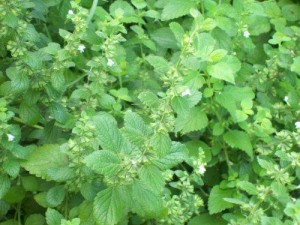 Overview: Lemon balm (Melissa officinalis), a member of the mint family, has long been considered a “calming” herb. It has been used since the Middle Ages to reduce stress and anxiety, promote sleep, improve appetite, and ease pain and discomfort associated with digestion (including flatulence and bloating as well as colic). Even before the Middle Ages, lemon balm was steeped in wine to lift the spirits, help heal wounds, and treat venomous insect bites and stings.
Overview: Lemon balm (Melissa officinalis), a member of the mint family, has long been considered a “calming” herb. It has been used since the Middle Ages to reduce stress and anxiety, promote sleep, improve appetite, and ease pain and discomfort associated with digestion (including flatulence and bloating as well as colic). Even before the Middle Ages, lemon balm was steeped in wine to lift the spirits, help heal wounds, and treat venomous insect bites and stings.
Several studies have found that lemon balm combined with other calming herbs (such as valerian) helps reduce anxiety and promote sleep. Few studies have investigated the safety and effectiveness of oral lemon balm alone, however. For example, in one recent study of people with minor sleep disorders, those who ingested an herbal combination of valerian and lemon balm reported sleeping much better than those who ingested placebo pills. It is not clear from these studies, however, whether lemon balm itself (or the combined action of lemon balm and valerian) is responsible for these sleep-inducing effects.
Ointments containing lemon balm may help heal lip sores associated with herpes simplex virus (HSV). In one study of 116 people with HSV, those who applied lemon balm cream to their lip sores experienced significant improvement in redness and swelling after only two days. Although other symptoms, (such as pain and scabbing) did not improve, both the patients and their physicians reported that the lemon balm ointment was highly effective.Although few rigorous scientific studies have been conducted on lemon balm, many professional herbalists suggest that this herb is beneficial for a variety of health problems including Alzheimer’s disease, attention deficit/hyperactivity disorder (ADHD), indigestion, insomnia, and hyperthyroidism. Experimental laboratory studies also suggest that lemon balm has antioxidant and anti-HIV properties, but further studies are needed to confirm these findings.
Plant Description: Lemon balm is native to Europe but is now grown all over the world. It is grown not only in herb gardens, but also in crops for medicine, cosmetics, and furniture polish manufacturing. The plant grows up to two feet in height, sometimes higher if left not maintained. In the spring and summer, clusters of small, light yellow flowers grow where the leaves meet the stem. The leaves are very deeply wrinkled and range from dark green to yellowish green in color, depending on the soil and climate. If you rub your fingers on them, your fingers will smell tart and sweet, like lemons. The leaves are similar in shape to mint leaves, and in fact, come from the same plant family.
Usable part: Use the leaves (Folia Melissae) and flowering top sections of the stem (Herba Melissae).Lemon balm preparations are made from the leaves of the plant. Essential oils made from lemon balm leaves contain plant chemicals called terpenes, which play at least some role in the herb’s relaxing and antiviral effects. Lemon balm also contains substances called tannins, which are thought to cause many of the herb’s antiviral effects. Lemon balm also contains eugenol, which calms muscle spasms, numbs tissues, and kills bacteria.
Chemical Composition in dried herb:
Flavinoids – Quercitrin, rhamncitrin, rhamnazin
Flavinoid sub – category 7- glucocide- Apigenin, kaempferol, quercetin, luteolin.
Phenolic acids and tannins – Rosmarinic acid (up to 4%), glycoside bound caffeic acid and chlorogenic acids, ferulic acid, hydroxycinnamic acid, protocatechuic acid.
Triterpenic acids – Ursolic acid, pomolic acid, oleonolic acid.
Additional components- Methyl carnosoate, 2-(3’4’-dihydroxyphenol)-1,3-benzodioxole-5-aldehyde.
Uses: Lemon balm tea is the ultimate elixir for gastrointestinal ailments, flatulence and indigestion and is known to work wonders on your strained nerves. Drinking lemon balm tea daily would ensure that you enjoy your night snooze without break and would keep your hormones from wreaking havoc on your system.
Lemon balm is a potent herbal drug that can be used to treat a host of illness ranging from anxiety to sleep apnea and more. Apart from its calming effect, lemon balm is applauded for its antibacterial, antiviral and antispasmodic properties and can alleviate all symptoms of restlessness, depression, excitement, headache and more. What’s more, lemon balm can be effectively used to treat herpes simplex, lip sores, soothe spasms, alzheimer’s disease and dementia.
Lemon balm has several antiseptic properties that can be used to treat allergies, skin rashes and acne. Just toss in some fresh lemon balm leaves in to your hot bath and soak yourself into its herbal goodness to relax your tensed nerves and open your skin pores. Lemon balm is considered to be a great skin cleansing agent and can be used in facial treatments to cleanse the skin.
Scrubbing your floor, kitchen table and even toilet seat with lemon balm infusion will keep bugs and flies out of your home. Lemon balm is a great insect repellant and can be used in campfires or barbecue pits to shoo away insects. You can also use sachets of dried lemon balm herbs in your wardrobe to save your clothes from bug or add it to your potpourri for a nice minty aroma.
You can buy from our online shop Lemon Balm.
 Български
Български
Leave a Reply to Lizabeth Cancel reply